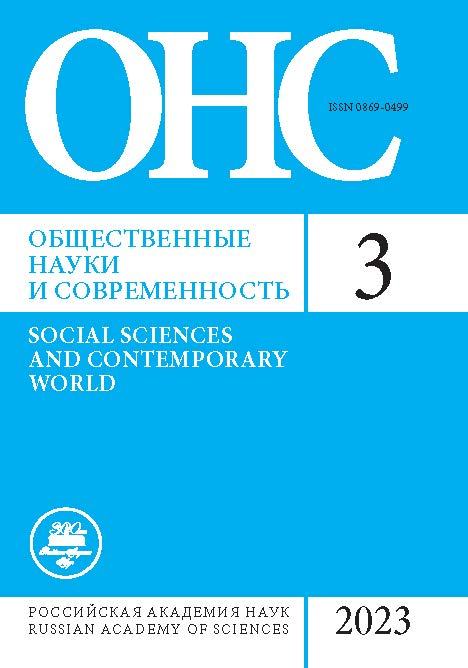External information pressure on russian youth as a tool of global confrontation
- 作者: Lukushin V.A.1,2
-
隶属关系:
- Institute of Scientific Information on Social Sciences of the Russian Academy of Sciences
- Financial University under the Government of the Russian Federation
- 期: 编号 3 (2023)
- 页面: 68-82
- 栏目: Communication studies
- URL: https://clinpractice.ru/0869-0499/article/view/675186
- DOI: https://doi.org/10.31857/S086904992303005X
- EDN: https://elibrary.ru/GHVNCJ
- ID: 675186
如何引用文章
详细
The results of a socio-political research studying the phenomenon of external information pressure on Russian youth in conditions of growing geopolitical tension and information confrontation between states are presented. Young people, as the most vulnerable social group, are exposed to the negative effects of the digitalization of information about military and political processes, including the transition of the concept of “hybrid warfare” into a new form. This new form is defined by the dominance of information and psychological impact and other methods of a predominantly non-military nature. Multi-stage methodology is used, including cognitive mapping of digital content, automated social media analysis of information flows, unstructured group interviews, as well as methods of metaphorical associative cards and online questionnaires. It is revealed that the number of Russian regions targeted by external information pressure on young people increased. The scheme of relevant content circulation and the active role of foreign media structures in this process are identified. The semantics of information flows and features of targeted impact on different age groups are defined. The results of the study show a weak perception of fake information on the Internet by young people and highlight the formed demand for the development of modern competences of digital literacy and information security.
作者简介
Vladimir Lukushin
Institute of Scientific Information on Social Sciences of the Russian Academy of Sciences;Financial University under the Government of the Russian Federation
Email: valukushin@fa.ru
Moscow, Russia
参考
- Ахмадеев К.Н., Бреслер М.Г., Манойло А.В. (2021) Эффективность fake news как инструмента информационной войны в восприятии поколения Z // Вестник Московского государственного областного университета. № 3. С. 8-32.
- Бродовская Е.В., Домбровская А.Ю., Пырма Р.В. (2020) Дискурсы внешнего информационного давления в Крымском и Севастопольском сегментах Рунета: особенности, адресаты, конфликтогенный потенциал // Политическая наука. № 3. С. 243-265.
- Бродовская Е.В., Лукушин В.А., Давыдова М.А. (2022) Векторы развития электоральных установок российской молодежи: результаты когнитивной инструментальной диагностики // Власть. № 3. С. 80-84.
- Конышев В.Н., Парфенов Р.В. (2019) Гибридные войны: между мифом и реальностью // Мировая экономика и международные отношения. Т. 63. № 12. С. 56-66.
- Лихачева Э.В., Николаева Л.П., Огнев А.С., Огнева А.А., Огнева Н.А. (2022) Использование элементов когнитивно-поведенческой терапии для повышения эффективности визуального кинетического моделирования // Человеческий капитал. № 8. С. 160-165.
- Малков С.Ю., Ковалев В.И., Коротаев А.В. (2021) О математическом моделировании устойчивости функционирования социально-экономических систем // Информационные войны. № 1. С. 31-43.
- Манойло А.В. (2021a) Информационная война и новая политическая реальность (I) // Вестник Московского государственного областного университета. № 1. С. 100-132.
- Манойло А.В. (2021b) Информационная война и новая политическая реальность (II) // Вестник Московского государственного областного университета. № 2. С. 110-148.
- Манойло А.В., Петренко А.И., Рожин Б.А., Стригунов К.С. (2023) Фейки: траектория лжи. Информационный фронт специальной военной операции. М.: Горячая линия - Телеком. 272 с.
- Петров А.П.Ч., Прончев Г.Б. (2022) Гибридная война против России в контексте специальной военной операции по денацификации и демилитаризации Украины (анализ и математическое моделирование) // Вопросы политологии. Т. 12. № 11. С. 3647-3667.
- Стригунов К.С., Манойло А.В. (2022) Фейковые новости и технология превентивной делегитимизации выборов // Гражданин. Выборы. Власть. № 2. С. 98-109.
- Шатилов А.Б. (2022) Информационное и PR-сопровождение специальной военной операции России на Украине: основные тренды и уроки первого этапа // Гуманитарные науки. Вестник Финансового университета. Т. 12. № 4. С. 71-76.
- Apuke O.D., Omar B. (2021) Fake News and COVID-19: Modelling the Predictors of Fake News Sharing among Social Media Users // Telematics and Informatics. No. 56.
- Clack T., Johnson R. (2021) The World Information War. Western Resilience, Campaigning, and Cognitive Effects. Abingdon: Routledge. 316 p.
- Hoffman F.G. (2007) Conflict in the 21st Century: The Rise of Hybrid Wars. Arlington: Potomac Institute for Policy Studies. 72 p.
- Johnson R. (2018) Hybrid War and Its Countermeasures: A Critique of the Literature // Small Wars & Insurgencies. Vol. 29. No. 1. Pp. 141-163.
- Miller C. (2019) Inside the Information Wars // New Scientist. Vol. 244. No. 3252. Pp. 38-41.
- Nadolski M., Fairbanks J. (2019) Complex Systems Analysis of Hybrid Warfare // Procedia Computer Science. Vol. 153. Pp. 210-217.
- Prier J. (2017) Commanding the Trend: Social Media as Information Warfare // Strategic Studies Quarterly. No. 11. Pp. 50-85.
- Zimmer F., Scheibe K., Stock M., Stock, W.G. (2019) Fake News in Social Media: Bad Algorithms or Biased Users? // Journal of Information Science Theory and Practice. No. 7. Pp. 40-53.
补充文件









